Chico Science
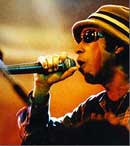
Chico Science: Sound of the mangroves
by JOHN ARMSTRONG
CHICO Science, who has died in a car crash in Olinda aged 30, took the traditional rhythms of his home state Pernambuco in impoverished north-east Brazil, added rock, rap, reggae, funk, and a trace of heavy metal and produced mangue beat.
But it was more than just a beat, it became an aesthetic movement, with it name representing the evolution of the world out of mangue (literally a mangrove swamp). It had followers called mangue boys and girls, and a mangue manifesto proclaiming Chico's interest in comics, interactive TV, anti-psychiatry, street music, John Coltrane, chance, non-virtual sex, ethnic conflicts and drugs.
The north-east comprises conurbations like Recife and Olinda, where Chico was born, and the arid, almost feudal farming area, the Sertao, worked by smallholders drawn from Portuguese, African and indigenous Amerindian racial permutations. This is reflected in its music, including intriguing throwbacks such as Moorish scales and medieval Lusitanian dialect. The influx of post-Beatles foreign trends has tended, if anything, to strengthen this culture. And Forrock a fusion of rock and forro, the north-east's beer and accordion music arrived in Recife in the early 1970s.
A decade later Chico started playing with local bands like Hip-Hop Legion and Orla Orbe before forming his group Loustal - an homage to the French cartoonist - in 1988.
The aim was to rework forrock with 1960s Brazilian psychedelia and modern African-American beat. And out of the rump of Loustal, he formed Nacao Zumbi (Slave Nation), named after the legendary leader of a 19th-century slave revolt in north-east Brazil.
His groundbreaking debut album, Da Lama Ao Caos (From Mud to Chaos) in 1994, produced a shockwave analogous to that of the Sex Pistols in Britain. Brazilians, accustomed to dismissing the country's rock bands as American plagiarists, could hear under the post-punk sound, the forro and maracatu, the beat of Pernambucols Afro-Brazilian carnival processions. Last year's follow-up album was Afrocibedelia.
Chico, songwriter and performer, had a stage presence which drew comparisons with Jimi Hendrix. His was a fresh contribution to the anarchic, magnificent history of Brazilian popular music.
Chico Science (Francisco Franca), musician, born 1966; died February 2, 1997
The Guardian and The Observer on CD-ROM SOURCE: The Guardian DATE: 17 February 1997 FEA PAGE: 11 Obituary:
(c) 1997. copyright. Guardian Newspapers Ltd
Chico Science
3-13-1966 - 2-2-1997
The front man for the band Nação Zumbi and main man of the Mangue Beat
movement from Pernambuco (Northeast Brazil) had his career precociously
aborted by a car crash. Chico Science was engaged in hip hop and break dance
groups in the early 80s. By the end of that decade, he joined bands like
Orla Orbe and Loustal, who drew their inspiration from soul, funk and hip
hop. The fusion with Northeastern rhythms, especially maracatu, came in
1991, when Science met with rhythmic group Lamento Negro in the outskirts of
the town of Olinda. He proceeded to mix up percussive beats with the sounds
of his old group, so as to form Nação Zumbi. As a band, CSNZ started
performing in Recife (state capital) and Olinda, generating the Mangue Beat
"movement", which included a manifesto ("Caranguejos com Cérebro", or "Crabs
with Brains"). In 1993, on a quick tour around São Paulo and Belo Horizonte,
he managed to attract media attention. The first album, "Da Lama ao Caos",
awarded the band with national recognition. The second, "Afrociberdelia",
more pop and electronic, confirmed Chico’s innovative trends and helped
boost a series of Europe and US gigs, where they were acclaimed both by
audiences and critics. After the death of their leader, Nação Zumbi cut a
double record, in 1998, featuring new songs, live versions, DJ remixes and
the track "Chico – Death of a Rockstar" specially written by Goldie.
Discography
--------------------------------------------------------------------------------
"... Arte Viva in February of 1988 but the
band did not last (ibid.). In 1989 Orla Orbe was replaced by Loustal,
named after a famous French cartoonist whom Chico admired. Loustal
featured Chico as lyricist and singer, Lúcio on guitar, Alexandre ..."
Book: Maracatu Atomico: Tradition, Modernity,
and Postmodernity in the Mangue Movement and the "New Music Scene" of Recife,
Pernambuco, Brazil (Current Research in Ethnomusicology: Outstanding
Dissertations)
by Philip Galinsky
Career albums
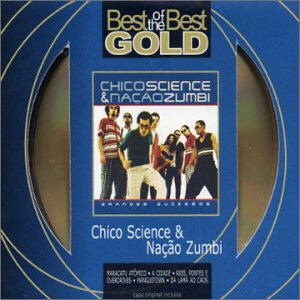
Grandes Sucessos
Chico Science & Nacao Zumbi
Audio CD (September 18, 2002)
Label: Sony
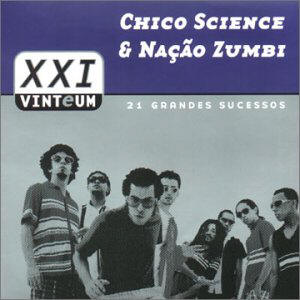
Serie XXI
Chico Science, Nacao Zumbi
Audio CD (August 23, 2000)
Label: Sony
Greatest Hits Compilation featuring `maracatu Atomico,` `mateus Enter,` `o
Cidadao Do Mundo,` `a Praieira` and `computadores Fazem Arte.`
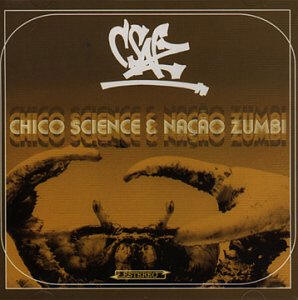
Audio CD (June 4, 1999)
Number of Discs: 2
Label: Sony
CSNZ 1998
CD
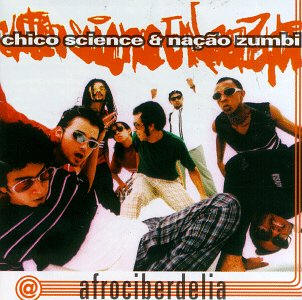
AFROCIBERDELIA: Audio CD (August 27, 1996)
Original Release Date: August 27, 1996
Number of Discs: 1
Label: Sony International
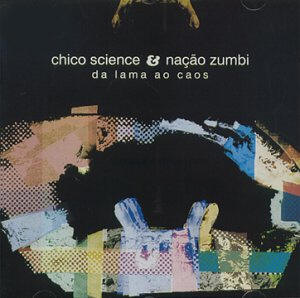
DA LAMA AO CAOS 1994
Vinyl, CD
1. Monologo Ao Pe Do Ouvido
2. Banditismo Por Uma Questa
3. Rios Pontes & Overdrives
4. Cidade
5. Praieira
6. Samba Makossa
7. Da Lama Ao Caos
8. Maracatu De Tiro Certeiro
9. Salustiano Song
10. Antene Se
11. Risoflora
12. Lixo Do Mangue
13. Computadores Fazem Arte
14. Coco Dub